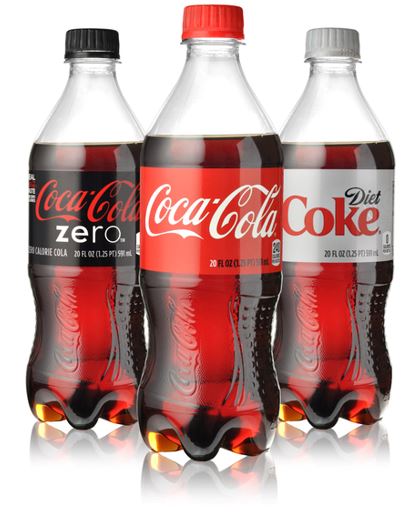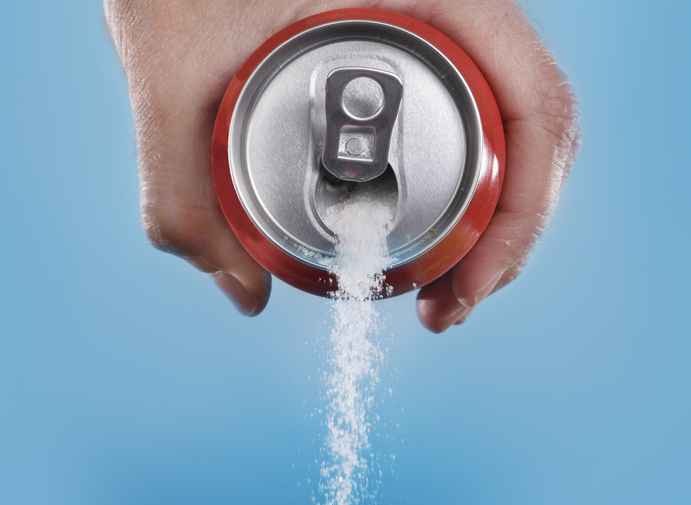A new study published this week in the journal Obesity got a lot of press this week for linking diet soda to weight loss.
But what’s the real story on diet soda? Does it cause more weight loss than drinking water will?
First, about the study: it was funded by the American Beverage Association, a trade association with backers such as Coca-Cola and Pepsi.
Over 300 people were randomized into 1 of 2 weight loss groups: those who were allowed to drink diet soda and those who could only drink water. Both groups received intensive weight-loss counseling, were encouraged to exercise more, and had to log their foods.

A lot of healthcare professionals and researchers have weighed in on this study, questioning limitations such as:
- Calories Weren’t Tracked In The Study – so if you have a sweet tooth and were in the diet soda group, you could satisfy your craving with a zero-calorie sweet-tasting product. But if you were in the water group with a sweet tooth, you likely just ate more food.
- Correlation Isn’t Causation – this study showed a correlation between diet soda and weight loss, not a causal link. There’s nothing in diet soda that pushed the pounds off; it’s just that that behavior was linked, in this case, to more weight loss.
- The Study Was Only 12 Weeks In Length – almost anyone can follow almost any diet plan for a short period of time. But what about the impact of long-term weight loss? Incorporating diet soda and being able to KEEP the weight off would be more impressive.
- People in the water group could only drink 24 oz. Water per day – the part of your brain that controls your hunger also controls your thirst. Only being able to drink 3 cups of water a day means the water drinker groupies probably turned to food when faced with thirst instead of more water.
This new study’s results contradict other recent studies that have shown a negative impact on health from diet soda:
- A 2009 study published in Diabetes Care showed diet soda intake was linked to greater risk of metabolic syndrome components and type 2 diabetes.
- In 2011, researchers from the University of Texas Health Science Center San Antonio showed that diet soda intake was linked to increased waist circumference.
- A 2013 study published in The American Journal of Clinical Nutrition showed sugar-sweetened beverages (regular soda) and artificially sweetened beverages (diet sodas) were associated with increased type 2 diabetes risk.
A new research study suggests that zero-calorie drinks can help people cut calories and avoid weight gain. However, in recent years, the idea that artificial sweeteners may deceive the brain and cause “metabolic derangements” has gained much traction.
A study has also looked at how diet sodas alter our gut microbiomes, potentially increasing the risk of metabolic diseases like type 2 diabetes or insulin resistance in some people.
It is critical to recognize that these findings are preliminary and on a small scale and that more research is required. Based on limited research, it’s too early to conclude that artificial sweeteners are harmful to humans.
Some Important Points to Note

1. Not All Sweeteners Satisfy
Professor Dr. Helen Hazuda of the University of Texas Health Center in San Antonio and senior author of the new study, says that “Your body tends to taste good, which means you consume energy” – that means calories – “If you burn it, it will turn into fat.” However, an artificial sweetener is 200 times more delicious than sugar without causing satiety.
2. It Can Lead to Overeating
When you deprive sweetness of its ability to satisfy, the link between eating and the role of calories in your body begins to fray. A study on rats found that when rats consumed yogurt with artificial sweeteners, they consumed fewer calories and gained more weight than when they ate sugar-sweetened yogurt.
It proves that no-calorie sweeteners interfere with the body’s natural ability to regulate incoming calories, which can predictably lead to sugar cravings and weight gain.
3. It Messes with the Microbes
A study on nature found that artificial sweeteners changed the colonies of gut bacteria in mice, making them vulnerable to insulin resistance and glucose intolerance. These are metabolic disorders that increase a person’s weight while also increasing the risk of type 2 diabetes.
4. Long Term Use Is Bad For Your Heart
According to a dietary supplements-based study done on 9,500 people who reported drinking one can of diet soda per day had a 34% higher risk of metabolic syndrome. Metabolic syndrome is many risk factors that can lead to heart disease and type 2 diabetes than those who do not drink diet soda.
The study did not fully present or offer a substance that would demonstrate a cause-and-effect relationship, but the findings astonished the researchers and ultimately asked for more research.
Bottom Line
One small, short-term study with some questionable beverage guidelines that may indicate a 4-pound weight loss difference compared to water drinkers certainly does not prove that diet soda is a weight-loss panacea.

